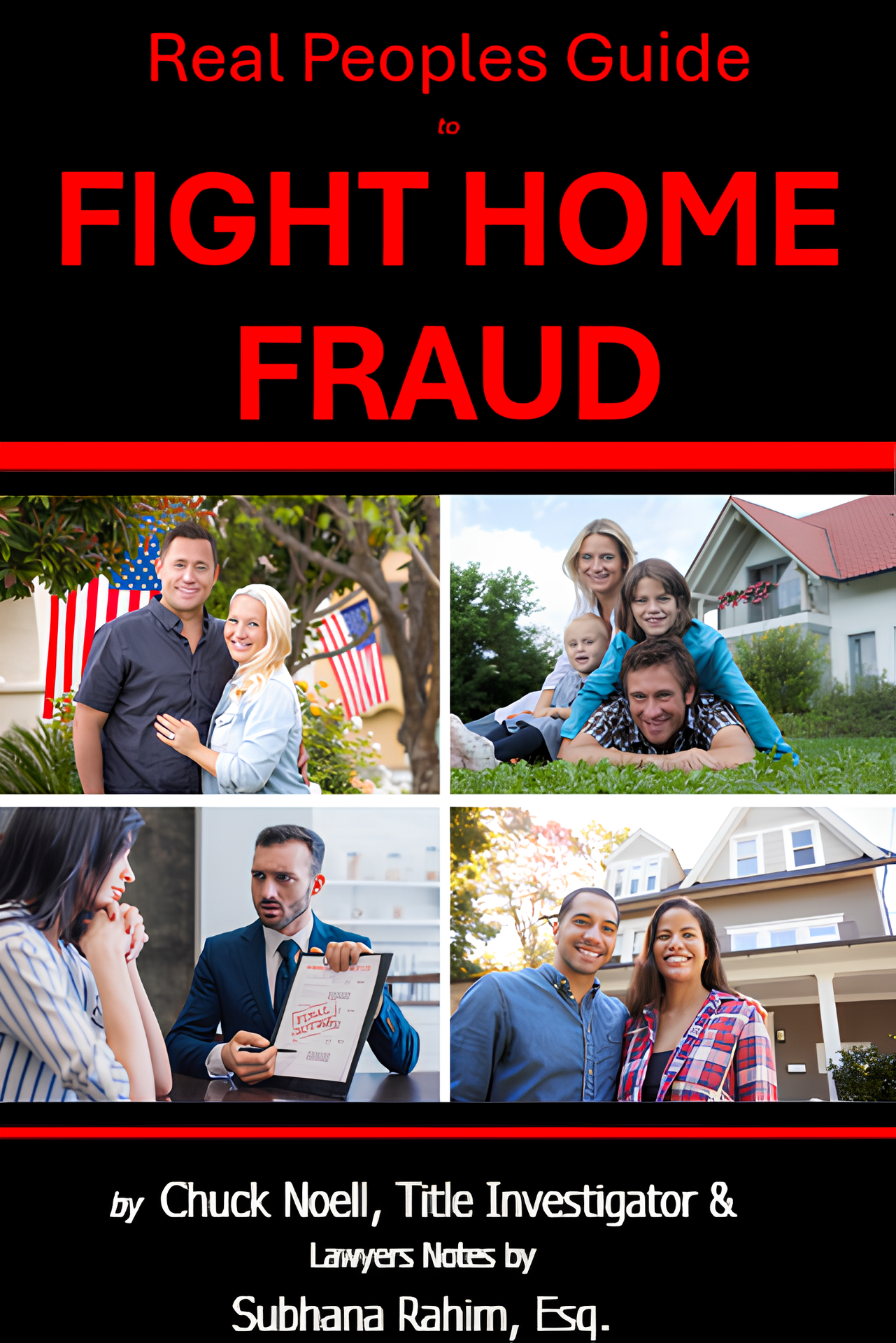
Do Not TRUST the Other Sides Attorney
They Have NO Obligation to You.
The Peril of Misplaced Trust: A Cautionary Tale from Real Estate Transactions
In the complex arena of real estate, the role of attorneys is pivotal. They are the navigators through the legal labyrinth that accompanies the buying, selling, or disputing of property. However, as highlighted in “The Real People’s Guide to Fighting Real Estate Fraud,” placing undue trust in the opposing side’s attorney can lead to dire consequences. Through vivid examples and expert commentary, the book sheds light on the importance of vigilance and independent legal counsel.
Case Studies of Deception
One of the most telling examples from the book involves a scenario where the opposing attorney exploited legal loopholes to secure an unjust advantage for their client. By presenting misleading information and leveraging their knowledge of the legal system, they were able to manipulate proceedings in a way that the layperson, trusting in the fairness of the process, was ill-equipped to counter. This story, among others, serves as a stark reminder of the potential for ethical breaches in legal practice.
The Ethical Quandary
Attorneys are bound by a code of ethics, which includes the duty to act in the best interests of their clients. Yet, the reality is that not all attorneys adhere to these principles scrupulously. The book recounts instances where attorneys, swayed by personal gain or loyalty to their client, have manipulated legal outcomes to the detriment of the opposing party. Such scenarios underscore the critical need for individuals to approach the opposing counsel with caution, aware of the inherent conflict of interest.
The Importance of Independent Legal Advice
The guide emphatically advises readers against relying on legal counsel associated with the opposing party. It highlights the invaluable role of independent legal advice in safeguarding one’s interests. Through the lens of real estate fraud, Noell and Rahim illustrate how attorneys committed to their client’s cause can, through omission or commission, act to the detriment of others involved. The lesson is clear: securing your own, trustworthy legal representation is not just a precaution; it’s a necessity.
Legal Advocacy and Its Limits
The book further delves into the dual role of attorneys as officers of the court and advocates for their clients. This dual obligation creates a tension between the duty to the legal system and the commitment to the client’s interests. The authors elucidate how this balance can sometimes tip in favor of advocacy, leading attorneys to adopt aggressive or even dubious strategies to win a case. The narratives presented serve as a caution to readers to be critical of the opposing side’s legal maneuvers and the motivations behind them.
Empowerment through Knowledge
Ultimately, “The Real People’s Guide to Fighting Real Estate Fraud” is a call to action for empowerment through knowledge. It encourages readers to educate themselves about the legal process, to question and verify the information presented by opposing legal representatives, and to actively participate in their legal defense or claims. The guide is a testament to the power of informed skepticism and the importance of independent legal counsel in navigating the treacherous waters of real estate transactions.
Conclusion
The sage advice from Noell and Rahim serves as a crucial reminder of the complexities inherent in legal disputes, particularly in real estate. Trusting the opposing side’s attorney without question can lead to outcomes that are contrary to one’s interests and justice at large. Through a careful selection of anecdotes and legal insights, the book not only educates but also empowers readers to approach such situations with the caution and critical thinking they warrant. In the realm of real estate and beyond, the wisdom to question and the courage to seek independent advice are invaluable allies.

Home Ownership is the American Dream

But you can be Cheated, and it can be Stolen from You

This is the Real Peoples Guide to Protecting Your Dream
Significant Risks
Real estate fraud can lead to severe consequences for unsuspecting buyers. Here are six super scary outcomes that can arise from falling victim to real estate fraud:
Loss of Your Home: Buyers may discover that the seller did not legally own the property to begin with, resulting in the loss of ownership and financial investment in the home.
Loss of Savings: Victims of mortgage fraud can lose their entire savings, used for down payments or closing costs, to scammers who disappear once the money is transferred.
Multiple Mortgages: Fraudsters might use forged documents to take out multiple mortgages on a property, leaving the legitimate buyer liable for debts they never incurred.
Legal Battles: Victims of title fraud often find themselves embroiled in lengthy and costly legal battles to prove their ownership or to clear their name from fraudulent activities associated with the property.
Legal Liability: Buyers unknowingly involved in fraudulent schemes may find themselves legally liable, facing lawsuits or even criminal charges for their unintentional participation.
Credit Ruin: Mortgage fraud can lead to situations where the buyer’s credit score is severely damaged, making it difficult to secure loans, mortgages, or any form of credit in the future.
Financial Ruin: The financial implications of title fraud can be devastating, including significant monetary loss, damaged credit, and the potential for bankruptcy.
Eviction: In cases where fraudsters succeed in transferring ownership, the rightful buyers may face eviction from their home, losing their place of residence along with their financial investment.
Foreclosure: If the fraud involves taking out a loan in the buyer’s name without their knowledge, they could be at risk of foreclosure on a home they thought they legally owned.
Identity Theft: Title fraud schemes may involve the theft of the buyer’s personal information, leading to further fraudulent activities and the long-term impact of identity theft.
These outcomes highlight the necessity of conducting thorough due diligence, investing in title insurance, and working with reputable professionals during the home buying process to mitigate the risks associated with real estate fraud.
Six Key Benefits for You
- Strategies for Due Diligence: The book provides practical advice on conducting due diligence, helping buyers verify the legitimacy of properties, sellers, and involved professionals.
- Knowledge of Legal Protections: It offers insights into legal rights and protections available to home buyers, empowering them to make informed decisions and seek recourse if needed.
- Preparation for Negotiations: Readers learn negotiation tactics and how to approach contracts, ensuring they can advocate for their best interests in transactions.
- Guidance on Choosing Trusted Professionals: The guide advises on selecting reputable real estate agents, lenders, and title companies, reducing the risk of falling prey to scams.
- Empowerment Through Education: By demystifying complex real estate processes and terminology, the book empowers buyers with the confidence to navigate the home buying process more securely and successfully.
- Enhanced Awareness of Fraud Risks: Readers gain a thorough understanding of the various types of real estate fraud, including mortgage and title fraud, enabling them to identify red flags in transactions.

Real Estate Fraud, including mortgage fraud and title fraud, pose serious dangers to buyers and sellers, resulting in devastating financial and emotional consequences.
For existing homeowners wanting to protect their home ownership, “The Real People’s Guide to Fighting Real Estate Fraud” is an invaluable resource.

Preventing real estate fraud safeguards your financial investment and gains.

Protecting yourself from home fraud boosts your confidence, and can inspire loved ones to protect their home ownership.

Discovering and Correcting home fraud ensures you won’t miss out on your home ownership benefits, value and profits.

Financial loss stemming from mortgage fraud can be substantial.

Don’t fall prey to the loss and embarrasment of being decieved by mortgage or title fraud.

You could find yourself losing your dream property or suffering great setbacks financially due to mortgage or title fraud.

